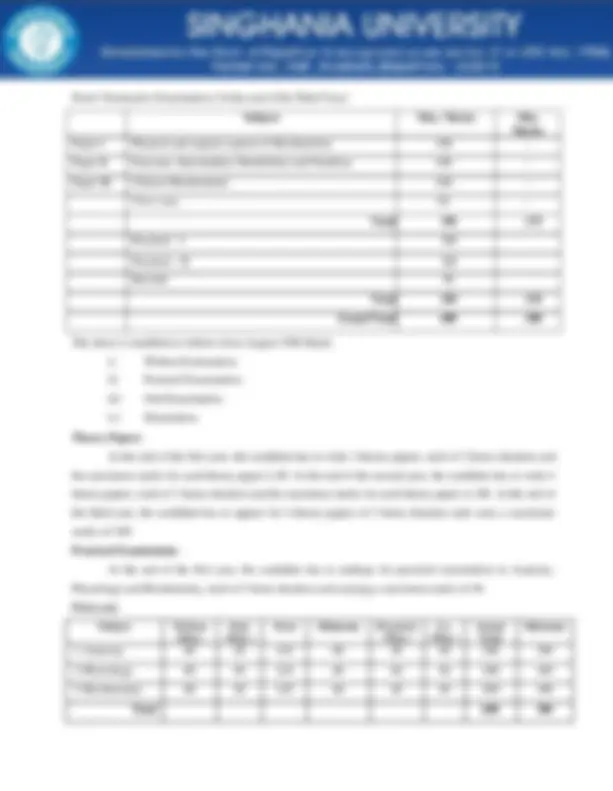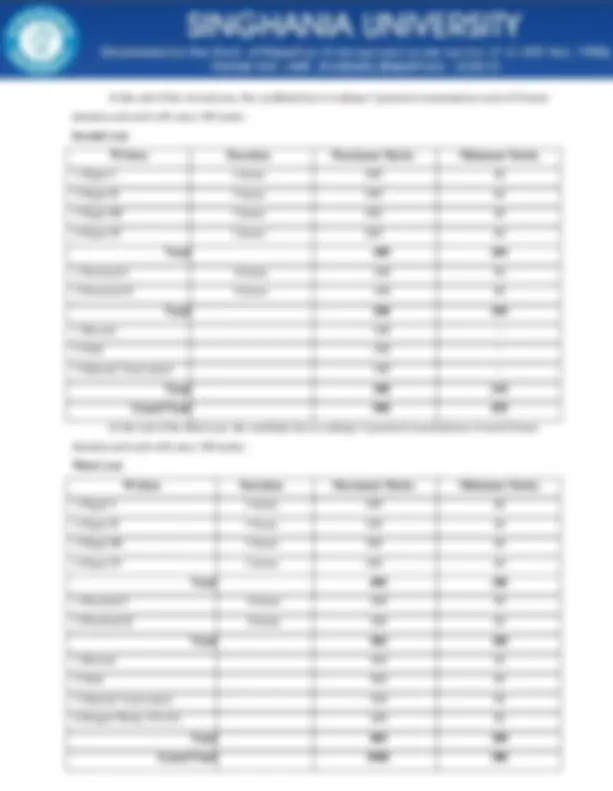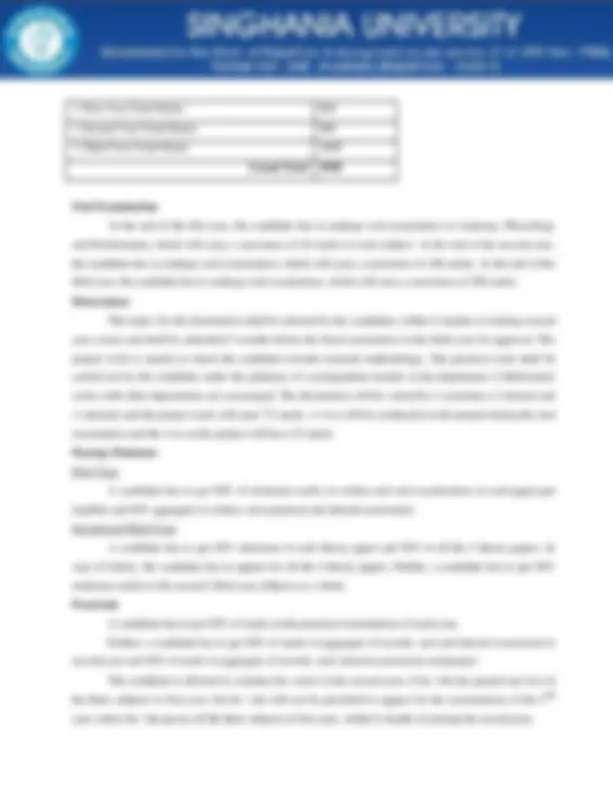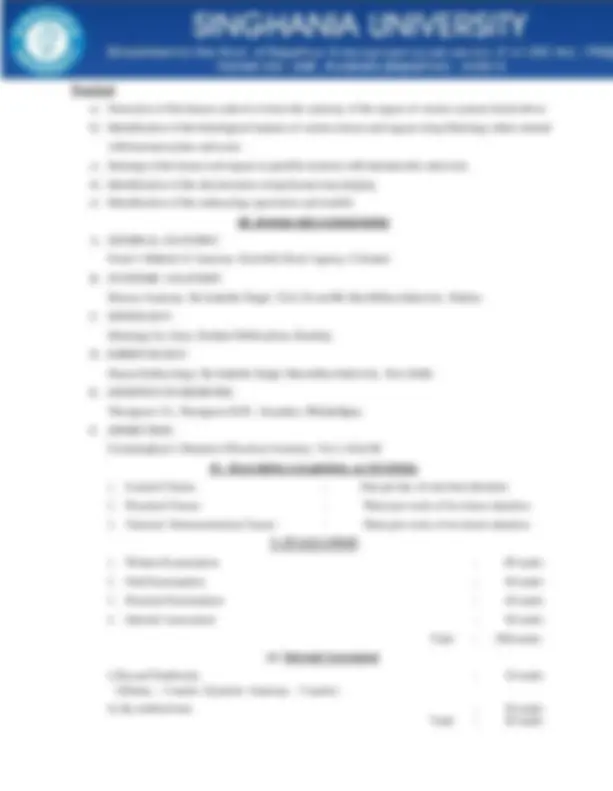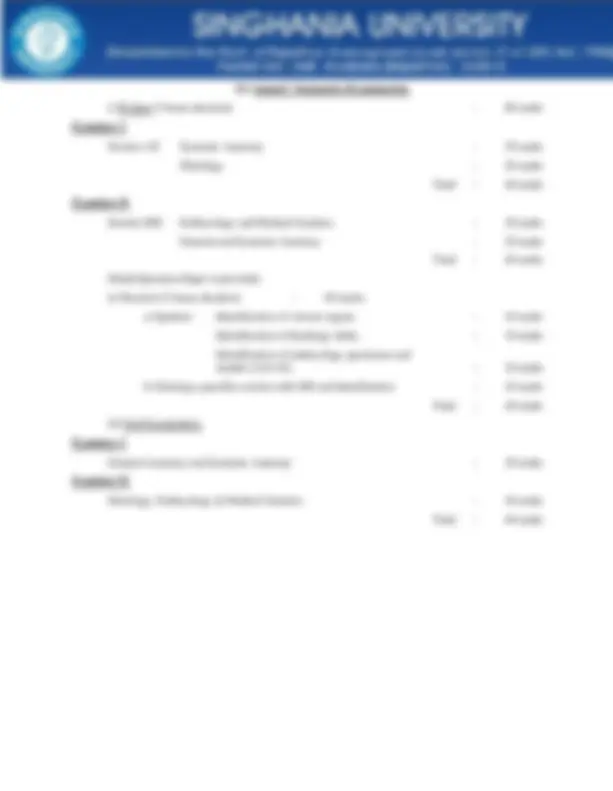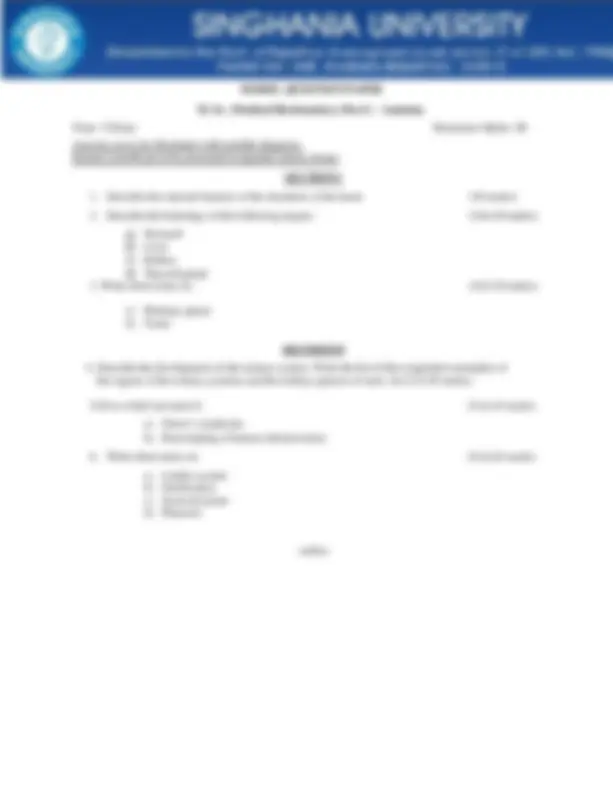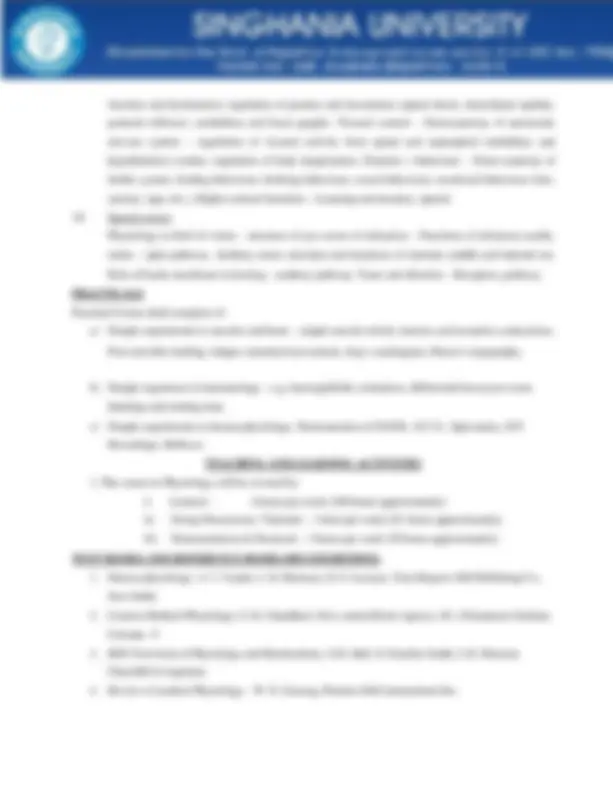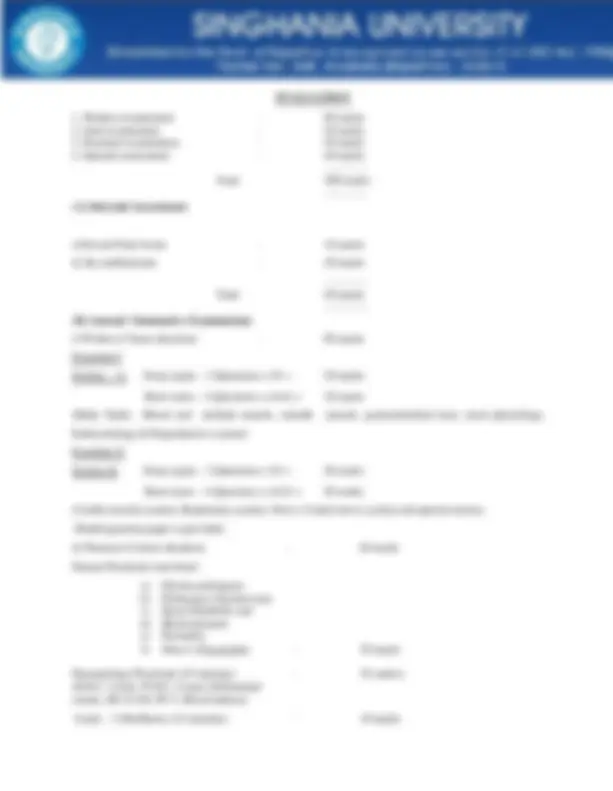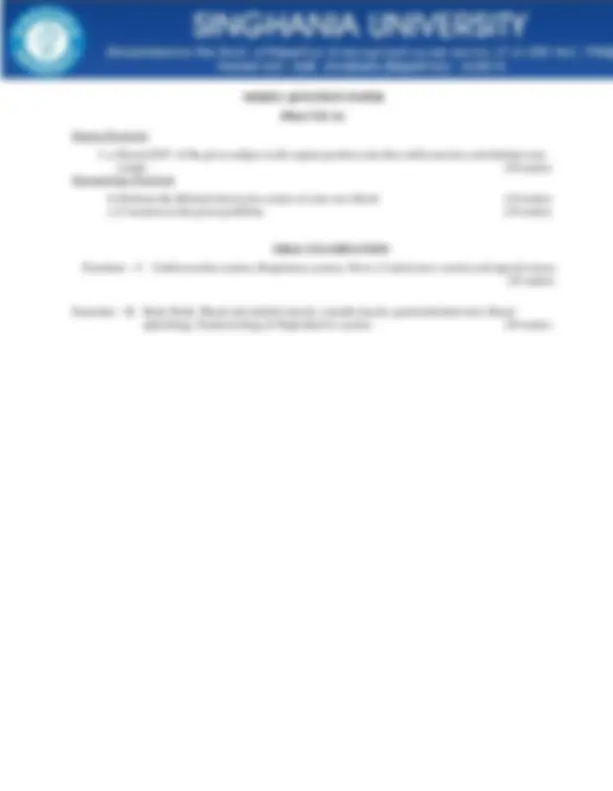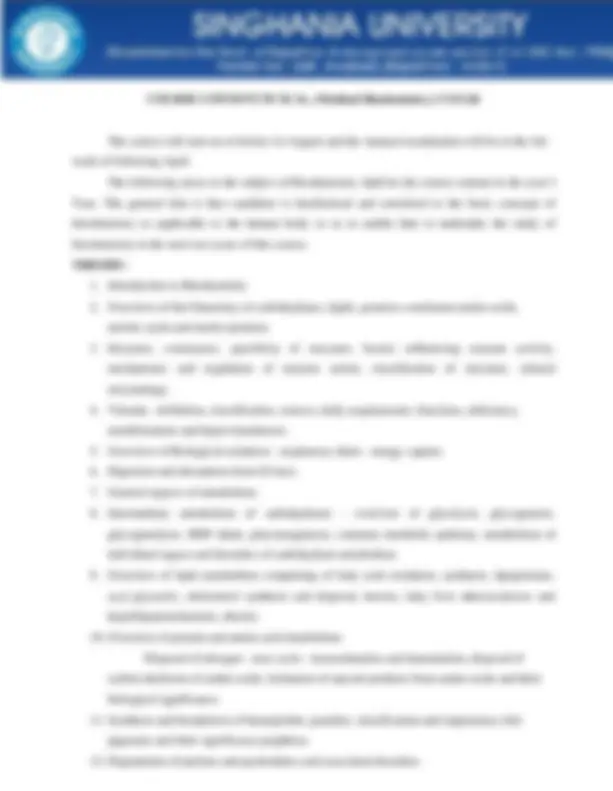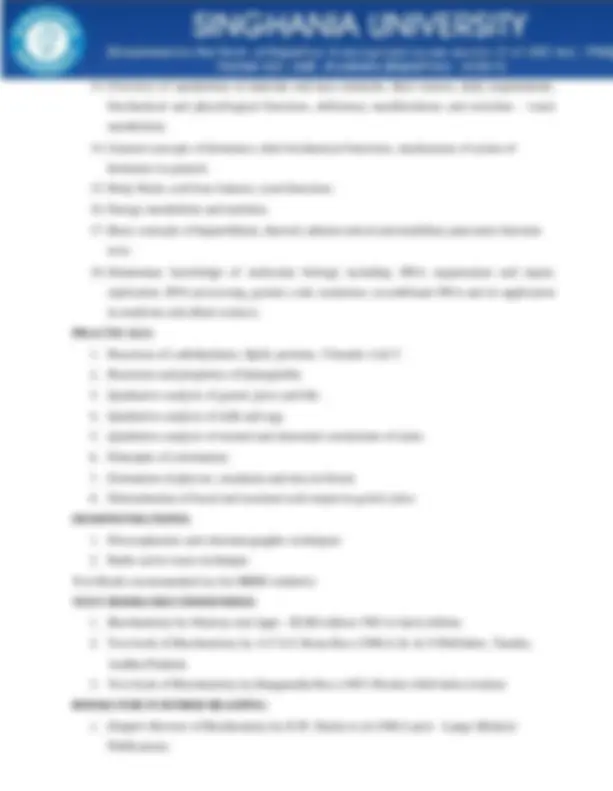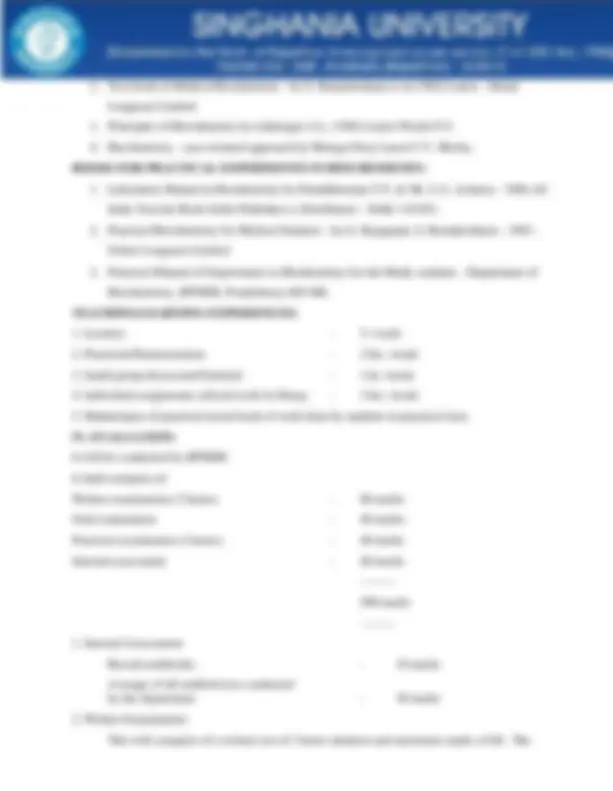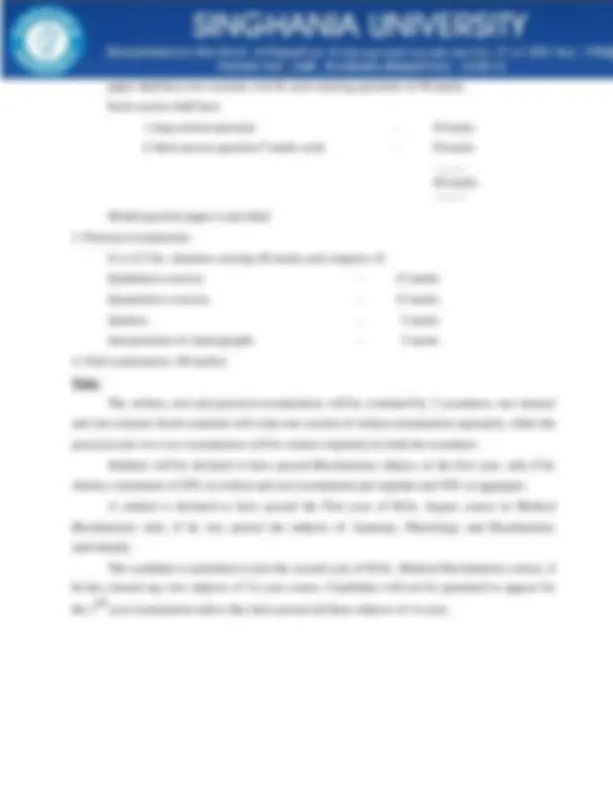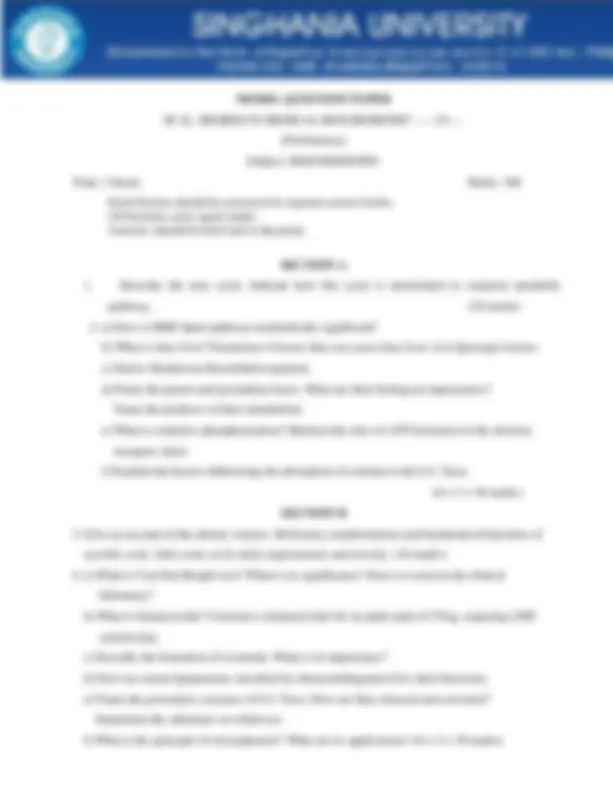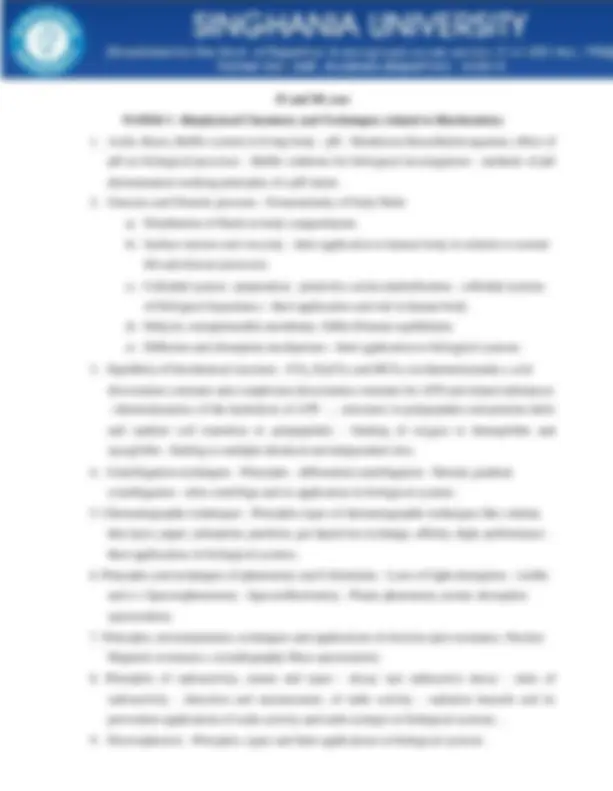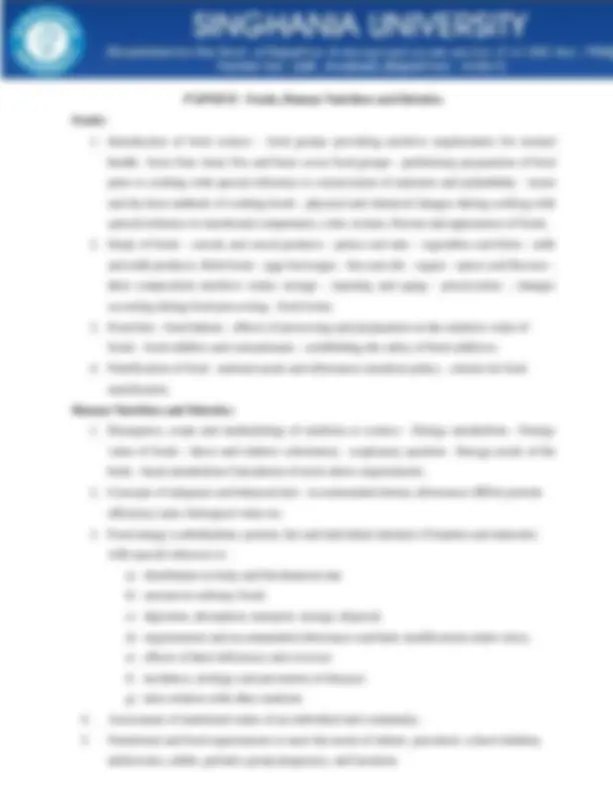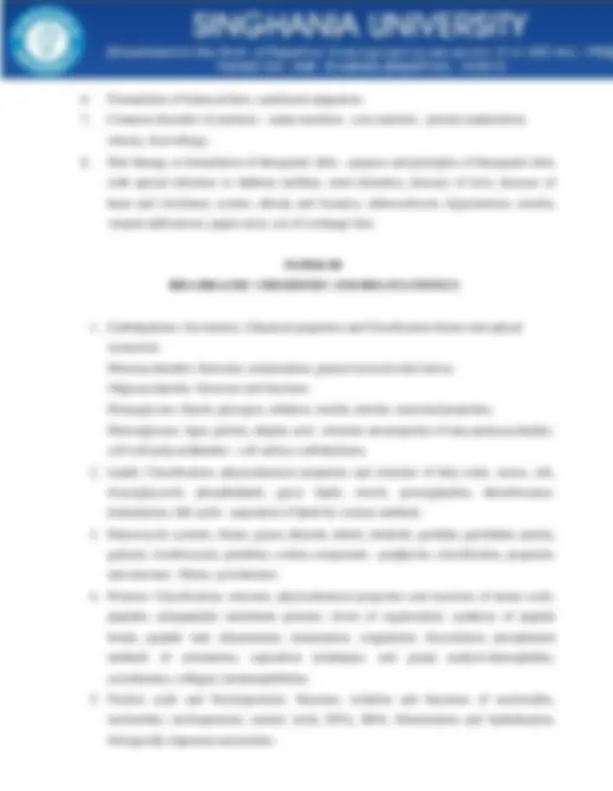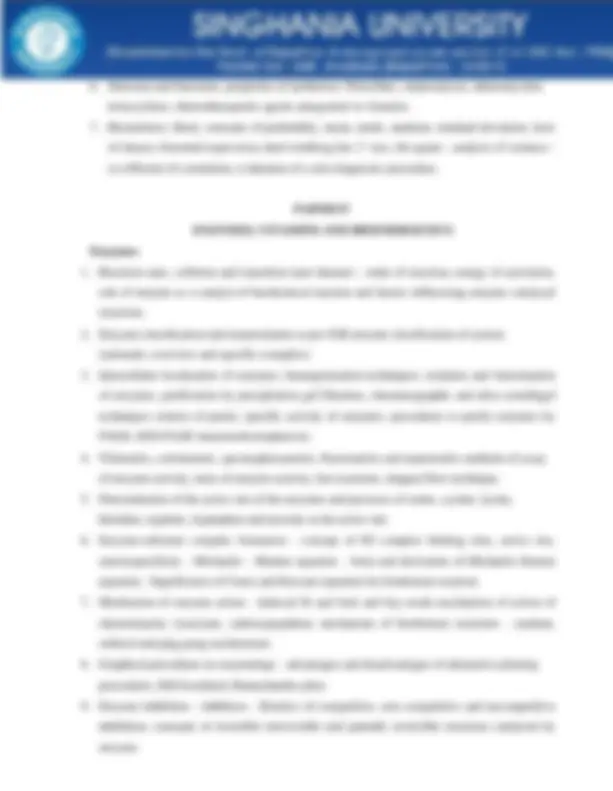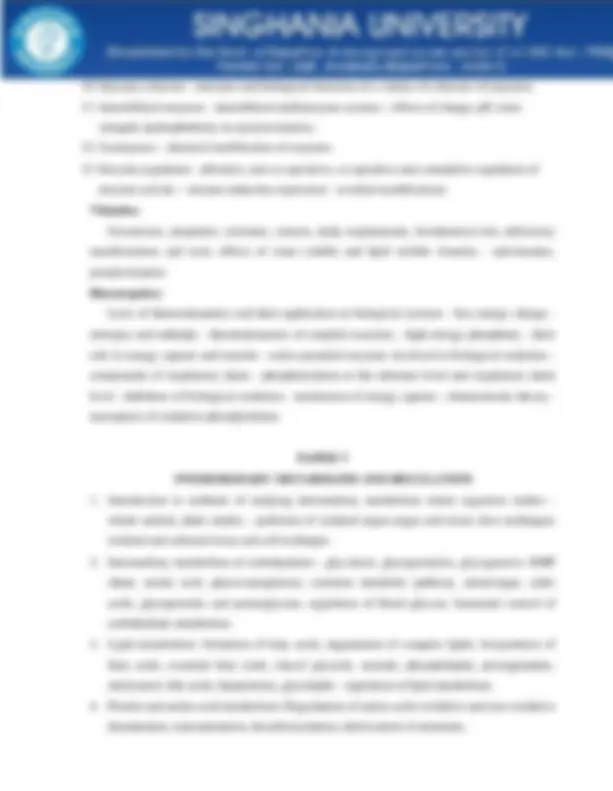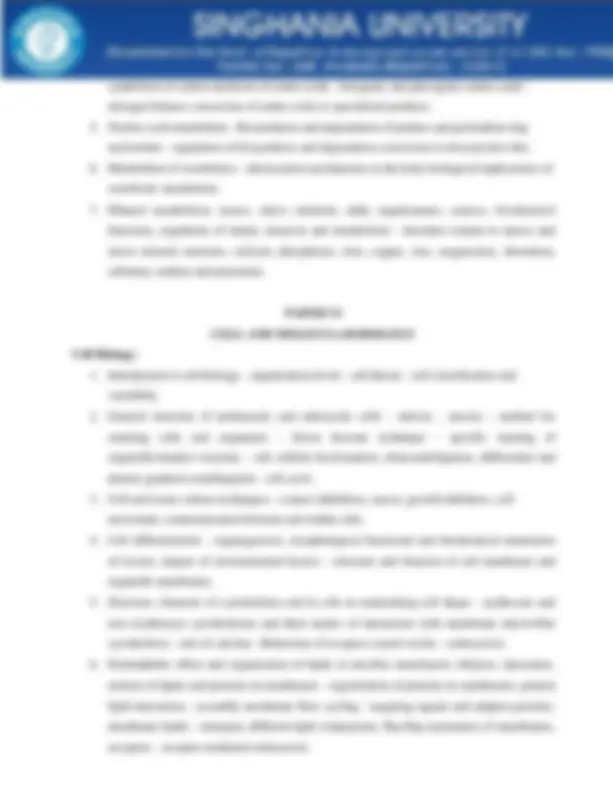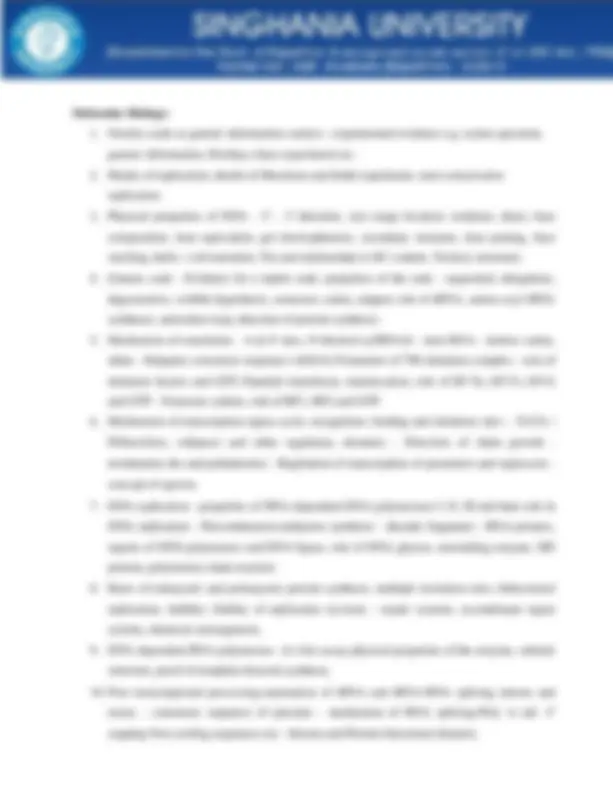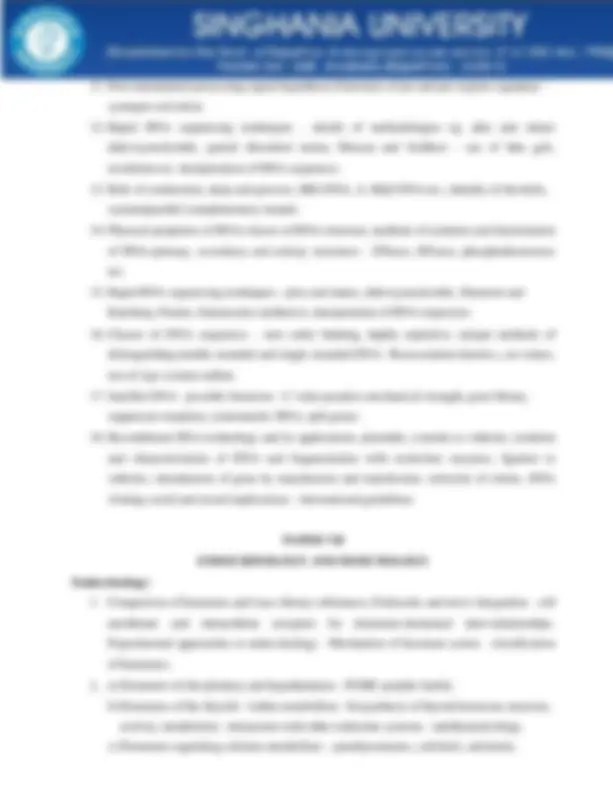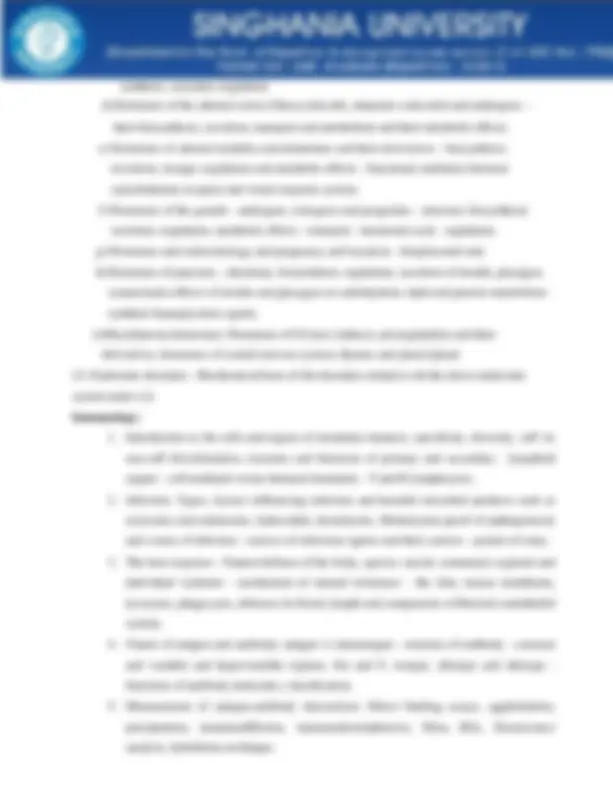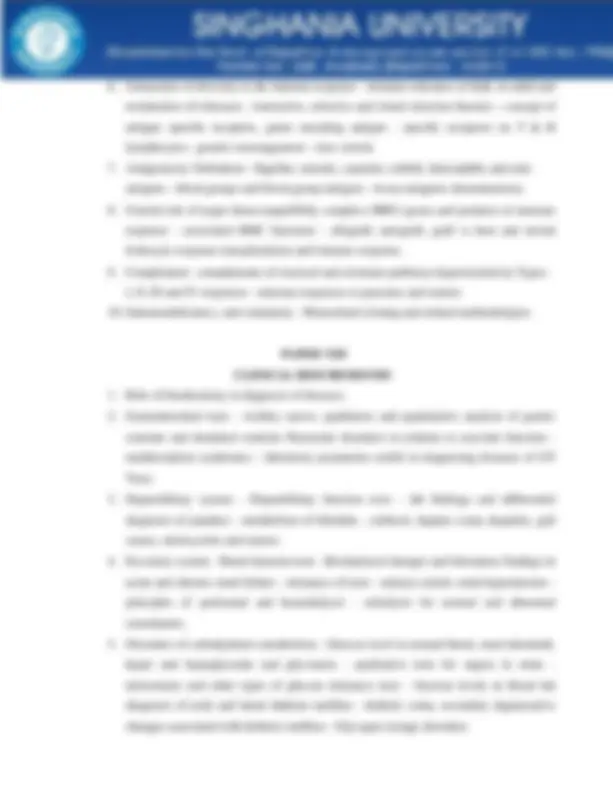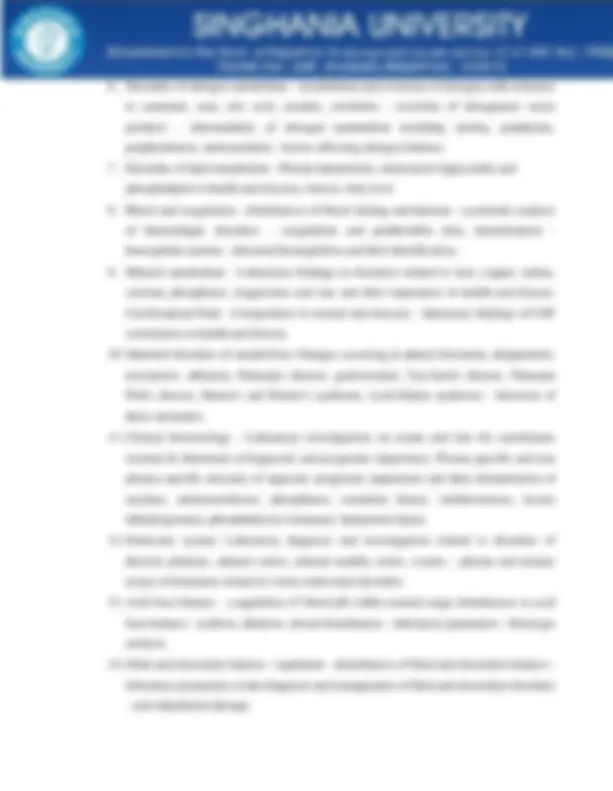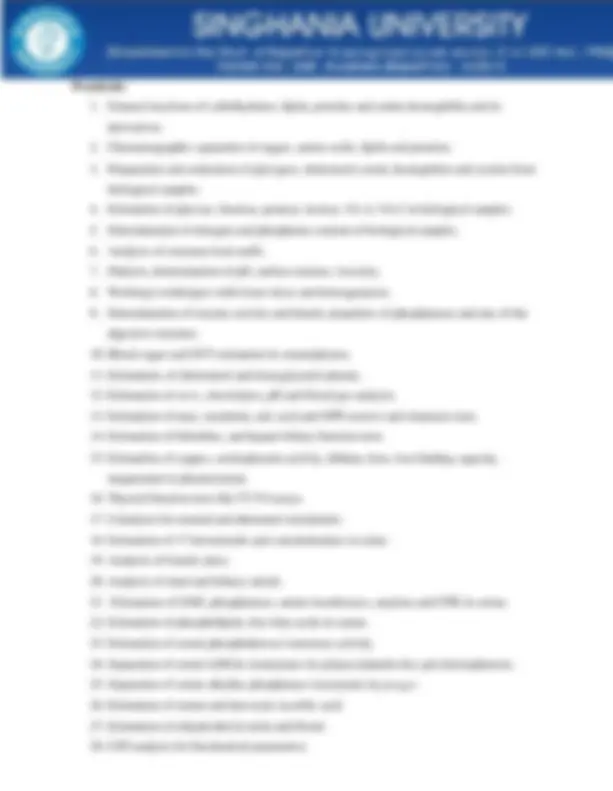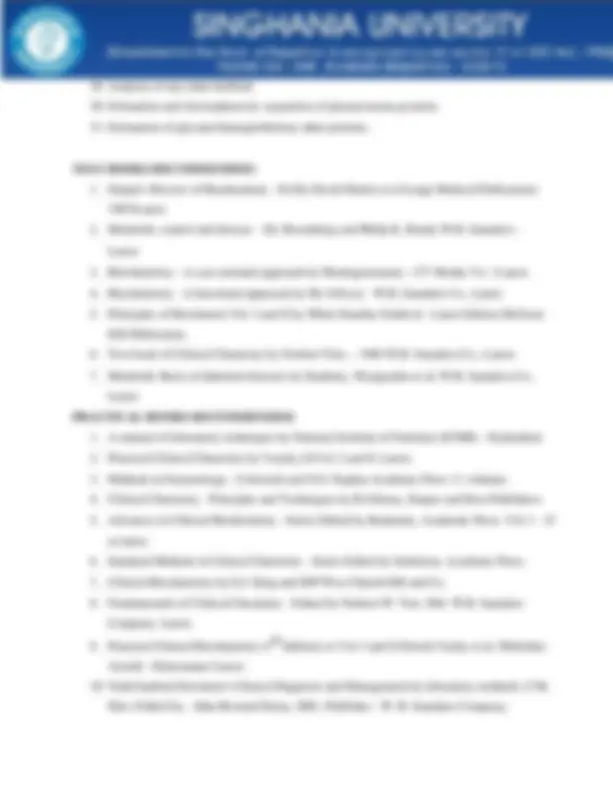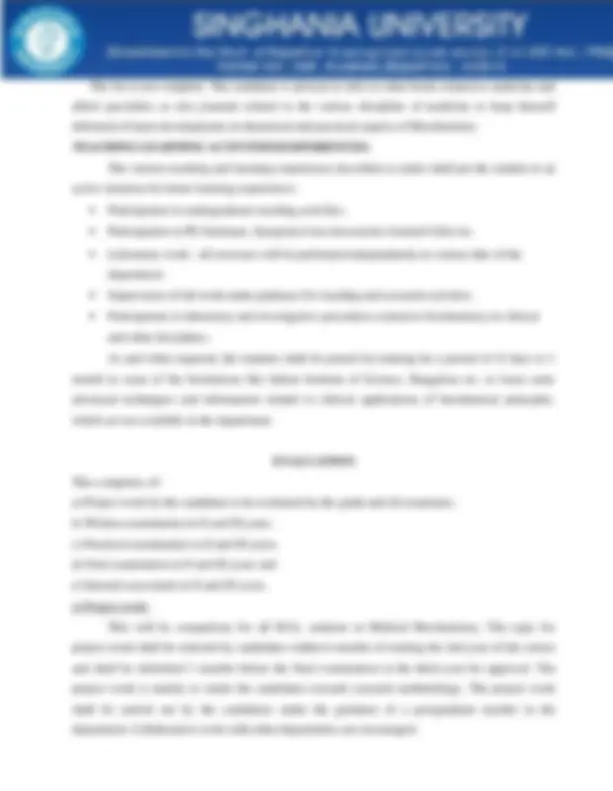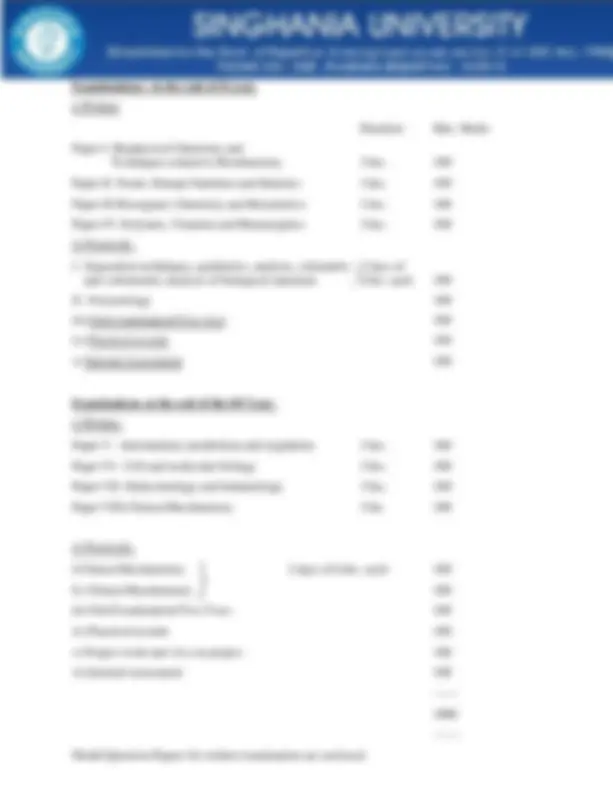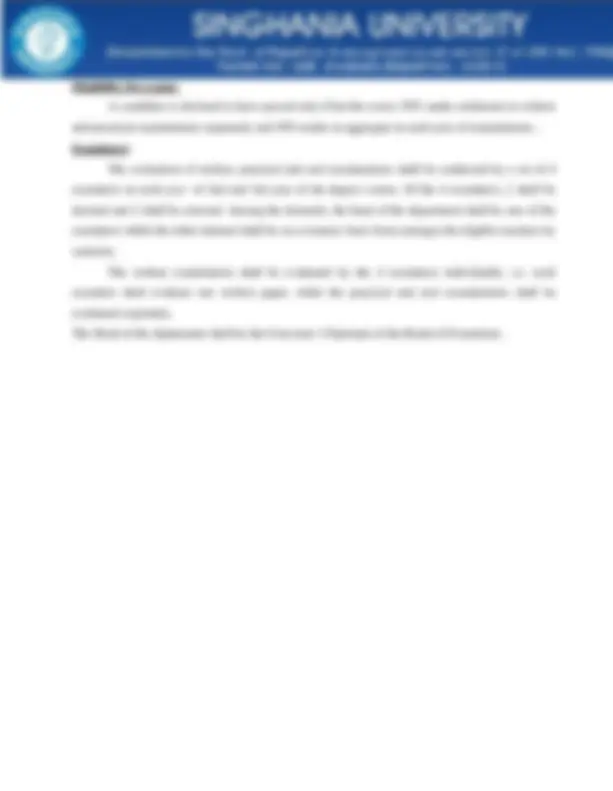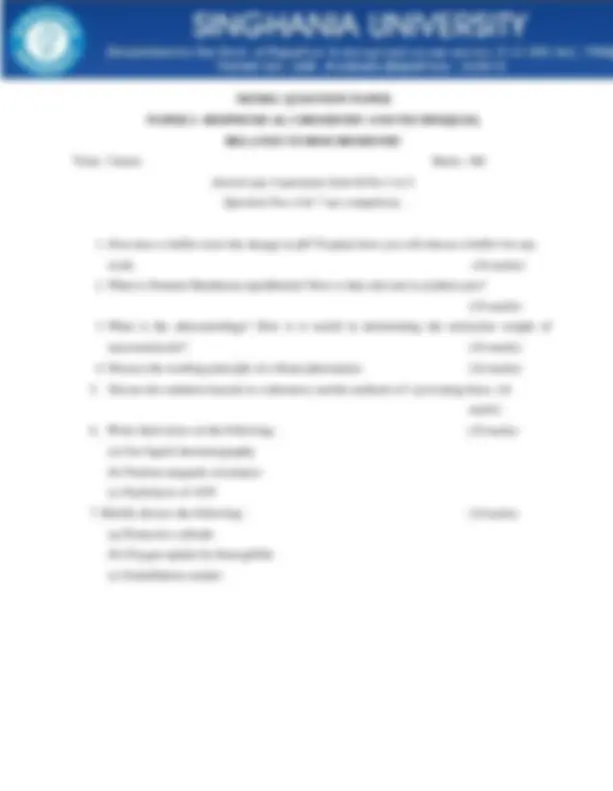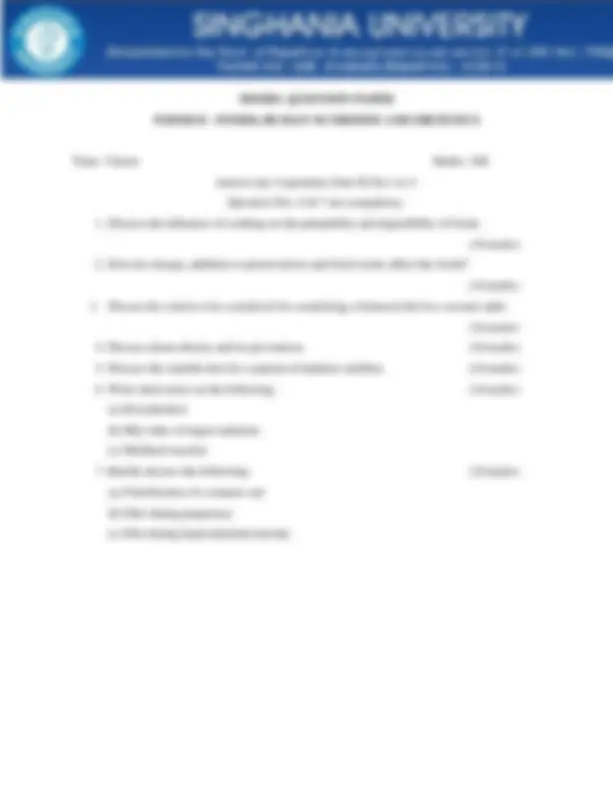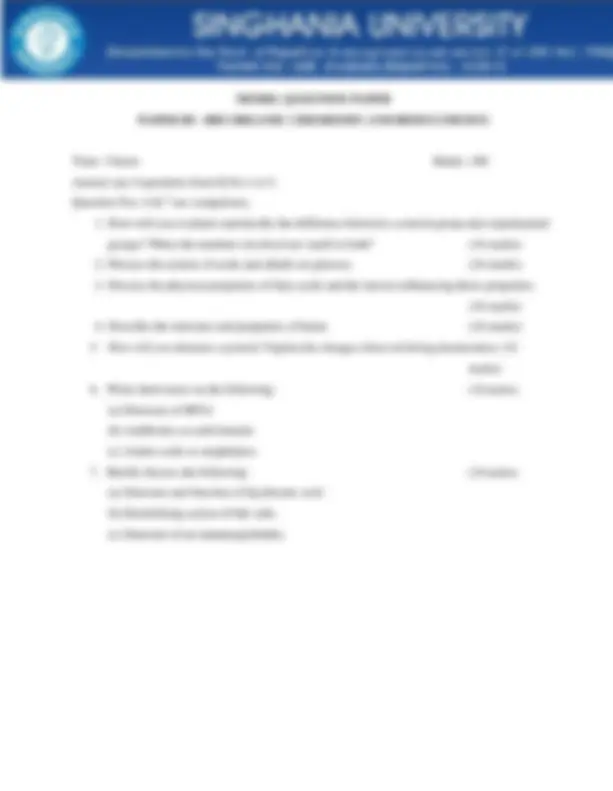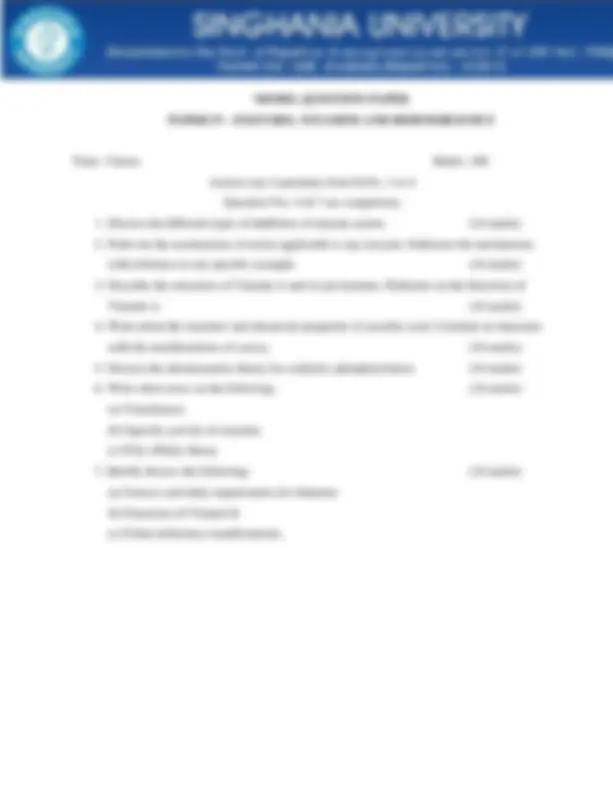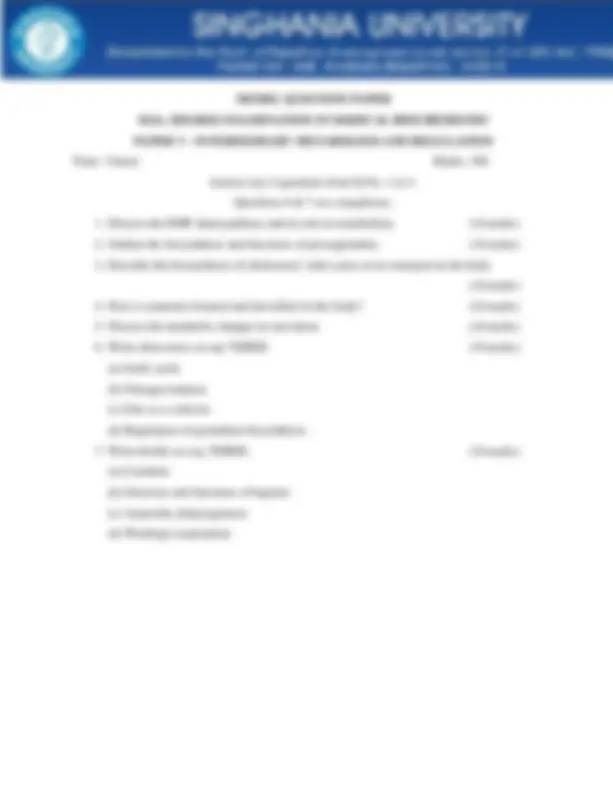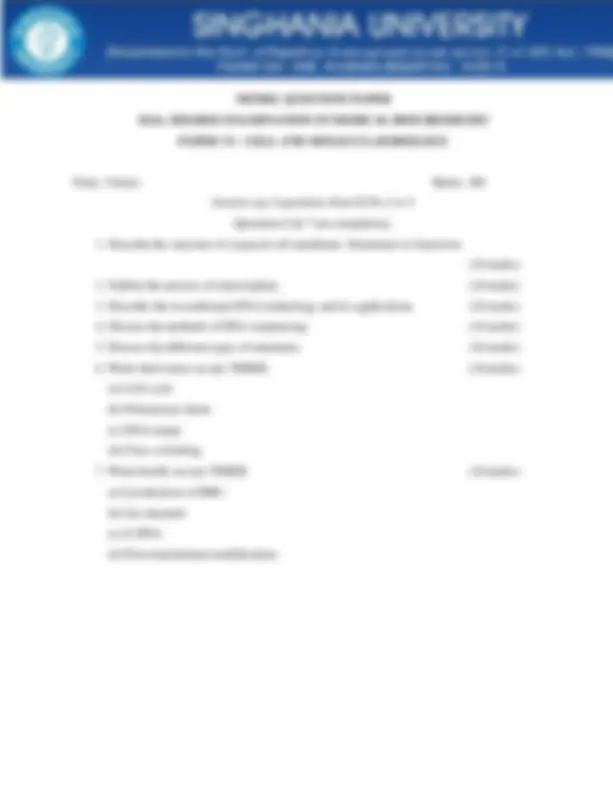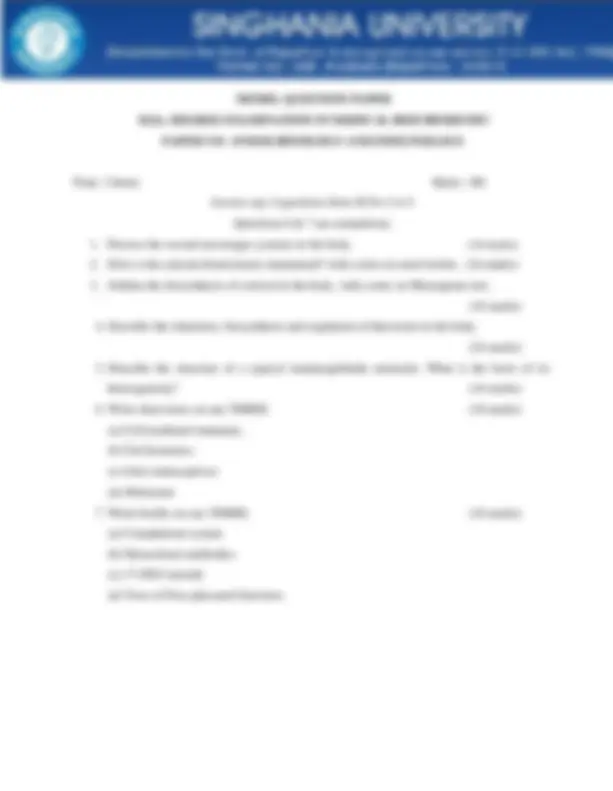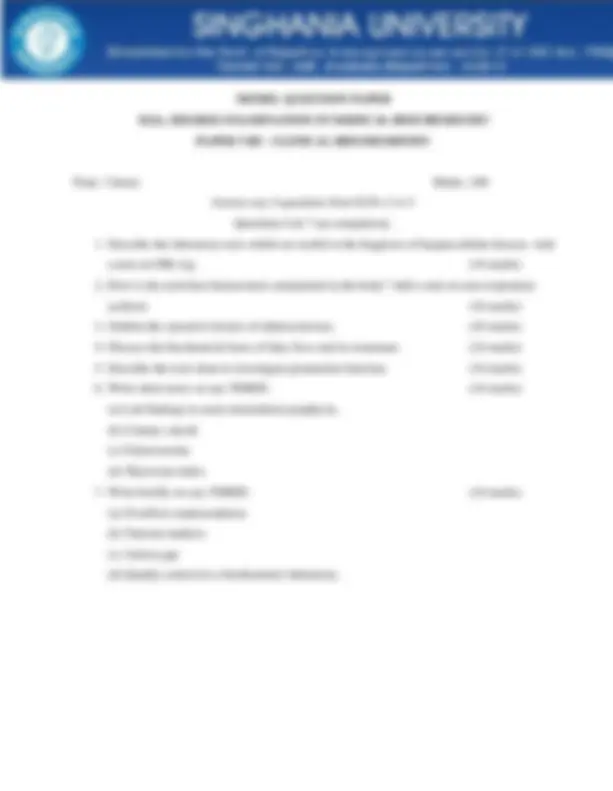Download Overview of Human Body Systems & Organs in M.Sc. (Med Biochem) Syllabus and more Lecture notes Medical Biochemistry in PDF only on Docsity!
CURRICULUM
M.Sc. (MEDICAL BIOCHEMISTRY) Course
M.Sc. (MEDICAL BIOCHEMISTRY)
CONTENTS
S. No. Text
1. Regulations
2. Examinations
3. Anatomy
4. Physiology
5. I year – Biochemistry
6. Paper I – Biophysical Chemistry & Techniques related to
Biochemistry
7. Paper II – Foods, Human Nutrition and Dietetics
8. Paper III – Bio-Organic Chemistry & Bio-Statistics
9. Paper IV – Enzymes, Vitamins & Bioenergetics
10. Paper V – Intermediary Metabolism & Regulation
11. Paper VI – Cell and Molecular Biology
12. Paper VII – Endocrinology & Immunology
13. Paper VIII – Clinical Biochemistry
14. Practicals
15. Evaluation
16. Model Question Papers
Duration of the course The M.Sc. (Medical Biochemistry) course is of 3 years duration. Scheme of Examination At present, the examination pattern followed is as follows: Preliminary Examination (At the end of the First Year) Subject Max. Marks Min. Marks Paper I Anatomy Written 100 -- Viva-voce 50 -- Internal Assessment 20 -- Total 170 85 Paper II Physiology Written 60 -- Biochemistry Written 40 -- Physiology Viva-voce 30 -- Physiology Internal Assessment 15 -- Biochemistry Viva-voce 20 -- Biochemistry Internal Assessment 15 -- Total 180 90 Grand Total 350 175
At the end of the second year, the candidate has to undergo 2 practical examinations each of 6 hours duration and each will carry 100 marks. Second year Written Duration Maximum Marks Minimum Marks
- Paper I 3 hours 100 40
- Paper II 3 hours 100 40
- Paper III 3 hours 100 40
- Paper IV 3 hours 100 40 Total 400 200
- Practical I 6 hours 100 50
- Practical II 6 hours 100 50 Total 200 100
- Record 100 --
- Oral 100 --
- Internal Assessment 100 -- Total 300 150 Grand Total 900 450 At the end of the third year, the candidate has to undergo 2 practical examinations of each 6 hours duration and each will carry 100 marks. Third year Written Duration Maximum Marks Minimum Marks
- Paper I 3 hours 100 40
- Paper II 3 hours 100 40
- Paper III 3 hours 100 40
- Paper IV 3 hours 100 40 Total 400 200
- Practical I 6 hours 100 50
- Practical II 6 hours 100 50 Total 200 100
- Record 100 50
- Oral 100 50
- Internal Assessment 100 50
- Project Work (75+25) 100 50 Total 400 200 Grand Total 1000 500
- First Year Total Marks 600
- Second Year Total Marks 900
- Third Year Total Marks 1000 Grand Total 2500
Oral Examination At the end of the first year, the candidate has to undergo oral examination in Anatomy, Physiology and Biochemistry which will carry a maximum of 40 marks in each subject. At the end of the second year, the candidate has to undergo oral examination, which will carry a maximum of 100 marks. At the end of the third year, the candidate has to undergo oral examination, which will carry a maximum of 100 marks. Dissertation The topics for the dissertation shall be selected by the candidates within 6 months of starting second year course and shall be submitted 3 months before the final examination in the third year for approval. The project work is mainly to orient the candidate towards research methodology. The practical work shall be carried out by the candidate under the guidance of a postgraduate teacher in the department. Collaboration works with other departments are encouraged. The dissertation will be valued by 2 examiners (1 internal and 1 external) and the project work will carry 75 marks. A viva will be conducted on the project during the oral examination and the viva on the project will have 25 marks. Passing Minimum First Year: A candidate has to get 50% of minimum marks in written and oral examinations in each paper put together and 50% aggregate in written, oral, practical and internal assessment. Second and Third Year: A candidate has to get 40% minimum in each theory paper and 50% in all the 4 theory papers. In case of failure, the candidate has to appear for all the 4 theory papers. Further, a candidate has to get 50% minimum marks in the second / third year subjects as a whole. Practicals A candidate has to get 50% of marks in the practical examinations of each year. Further, a candidate has to get 50% of marks in aggregate of records, oral and internal assessment in second year and 50% of marks in aggregate of records, oral, internal assessment and project. The candidate is allowed to continue his course in the second year, if he / she has passed any two of the three subjects in first year, but he / she will not be permitted to appear for the examinations of the 2nd year, unless he / she passes all the three subjects of first year, within 6 months of joining the second year.
CURRICULUM IN ANATOMY FOR FIRST YEAR M. Sc. (MEDICAL BIOCHEMISTRY)
I. DEPARTMENTAL OBJECTIVES
The students of M.Sc. Medical Biochemistry at the end of learning Anatomy during the First year of their course should be able to:
- Point out and state the names and gross anatomical features of the various systems of the human body.
- Recognise and state the histological features of the various tissues and organs of the human body.
- State the basic principles of the embryology of organs of the various systems of the human body; interpret the same in models and recognized the congenital anomalies in life and models.
- State the basic principles of Medical Genetics and recognize the karyotyping of human chromosomes in normal and abnormal states.
- Do staining of the tissue or the organ in paraffin section with haematoxylin and Eosin and identify the tissue or the organ.
- Continue to learn the anatomical aspects of the human body and apply the same in health care programmes. II. COURSE CONTENT The course will start on or before 1st^ August (Duration: August to April) and the Annual / Summative Examination will be in the 3rd^ week of the following April. The following areas in the subject of Anatomy shall be covered: ANATOMY Theory a) General Anatomy – Basic Principles b) General Histology – Basic Principles c) Systemic Histology d) General Embryology – Basic Principles e) Systemic Embryology f) A brief account of gross Anatomy of various organs of the following systems: i) Respiratory system ii) Circulatory system iii) Alimentary system iv) Excretory system v) Nervous system vi) Special sensory organs vii) Endocrine glands g) Medical Genetics – Basic Principles
Practical a) Dissection of the human cadaver to learn the anatomy of the organs of various systems listed above. b) Identification of the histological features of various tissues and organs using Histology slides stained with haematoxyline and eosin. c) Staining of the tissues and organs in paraffin sections with haematoxlin and eosin. d) Identification of the chromosomes using human karyotyping. e) Identification of the embryology specimens and models III. BOOKS RECOMMENDED A. GENERAL ANATOMY: Grant’s Method of Anatomy: Scientific Book Agency, Calcutta/ B. SYSTEMIC ANATOMY: Human Anatomy: By Inderbir Singh, Vol.I, II and III, MacMillan India Ltd., Madras C. HISTOLOGY: Histology by Arrey: Kothari Publications, Bombay D. EMBRYOLOGY: Hunan Embryology: By Inderbir Singh, Macmillan India Ltd., New Delhi E. GENETICS IN MEDICINE: Thompson J.S., Thompson M.W., Saunders, Philadelhpia. F. DISSECTION: Cunnuingham’s Manual of Practical Anatomy. Vol. I, II & III IV. TEACHING LEARNING ACTIVITIES
- Lecture Classes : One per day of one hour duration.
- Practical Classes : Three per week of two hours duration
- Tutorial / Demonstsration Classes : Three per week of two hours duration V. EVALUATION
- Written Examination : 80 marks
- Oral Examination : 40 marks
- Practical Examination : 40 marks
- Internal Assessment : 40 marks Total : 200 marks (a) Internal Assessment i) Record Notebooks : 10 marks (History – 5 marks; Systemic Anatomy – 5 marks) ii) By notified tests : 30 marks Total : 40 marks
MODEL QUESTION PAPER
M. Sc. (Medical Biochemistry) Part I – Anatomy Time: 3 Hours Maximum Marks: 80 Answers are to be illustrated with suitable diagrams. Section I and II are to be answered in separate answer books. SECTION I
- Describe the internal features of the chambers of the heart. (10 marks)
- Describe the histology of the following organs: (5x4=10 marks) a) Stomach b) Liver c) Kidney d) Thyroid gland
- Write short notes on: (5x2=10 marks) a) Pituitary gland b) Testis SECTION II
- Describe the development of the urinary system. Write the list of the congenital anomalies of the organs of the urinary systems and the embryo genesis of each. (6+2+2=10 marks) 5.Give a brief account of: (5x2=10 marks) a) Down’s syndrome b) Karyotyping of human chromosomes
- Write short notes on: (5x4=20 marks) a) Limbic system b) Ossification c) Synovial joints d) Pancreas
-oo0oo-
CURRICULUM IN PHYSIOLOGY FOR FIRST YEAR M. Sc. (MEDICAL BIOCHEMISTRY) I. DEPARTMENTAL OBJECTIVES The students of M.Sc. (Medical Biochemistry) at the end of learning Physiology during the First year of their course should be able to: i) state the functions of various organs and systems of the body ii) describe in brief the mechanisms of function of various systems in the body iii) apply basic principles of physiology to simple clinical conditions iv) know and utilize the knowledge of physiology in organizing simple experiments for biochemical work v) continue to learn the physiological aspects of human body SYLLABUS FOR PHYSIOLOGY FOR M.Sc. (MEDICAL BIOCHEMISTRY) THEORY :
- Introductory Principles Structure of cell and cell membrane, composition of intracellular and extracellular fluid, transport of substances across cell membrane, resting membrane potential.
- Body fluid and blood Body fluid – Body fluid compartments, composition + size, capillary – structure and filtration across capillary wall. pH and buffer system, principle of homeostasis. Body – Composition of blood, plasma proteins, bone marrow, erythrocytes – formation and fate, anaemia, jaundice, white blood cell, immune mechanism, platelets, haemostasis, blood types and blood transfusion.
- Nerve and muscle Nerve – Structure of neuron, excitability, action potential, conduction of nerve impulse, nerve fibre type, skeletal muscle – structure, cross bridge theory, types of muscle contraction – neuromuscular transmission – heart muscle – structure, electrophysiology, properties of cardiac muscle. Smooth muscle – structure, types – electrophysiology.
- Renal Physiology Cross and ultrastructure of nephron, glomerular filtration, tubular reabsorption and secretion, clearance, water excretion – counter current multiplier and exchanger, renal role in acid base balance, renal failure, mechanism and regulation of miturition.
- Endocrine and Reproductive Physiology a) Endocrine pancreas: Functional anatomy of islets, actions of insulin and insulin deficiency, regulation of insulin secretion, glucagon. b) Physiology of bone: Vit. D and Parathyroid, Calcium metabolism, Physiology of bone formation and destruction. Vit. D, parathyroid hormone – actions and effects of deficiency.
function and dysfunction; regulation of posture and locomotion (spinal shock, decerebrate rigidity, postural reflexes); cerebellum and basal ganglia. Visceral control – Neuroanatomy of autonomic nervous system – regulation of visceral activity from spinal and supraspinal (medullary and hypothalamic) centres, regulation of body temperatures. Emotion + behaviour – Neuro-anatomy of limbic system; feeding behaviour; drinking behaviour; sexual behaviour; emotional behaviour (fear, anxiety, rage, etc.). Higher cortical functions – Learning and memory; speech.
- Special senses Physiology in brief of vision – structure of eye, errors of refraction – Functions of refractory media, retina – optic pathway. Auditory sense; structure and functions of external, middle and internal ear. Role of basila membrane in hearing – auditory pathway. Taste and olfaction – Receptors, pathway. PRACTICALS Practical Course shall comprise of: a) Simple experiments in muscles and heart – simple muscle twitch, isotonic and isometric contractions. Free and after loading, fatigue, intestinal movements, frog’s cardiogram, Mosso’s ergography.
b) Simple experience in haematology – e.g. haemoglobinb, estimation, differential leucocyte count, bleeding and clotting time. c) Simple experiments in human physiology. Demonstration of B.M.R., E.C.G., Spirometry, B.P. Recordings, Reflexes. TEACHING AND LEARNING ACTIVITIES
- The course in Physiology will be covered by: i) Lectures - 4 hours per week (100 hours approximately) ii) Group Discussions / Tutorials – 1 hour per week (20 hours approximately) iii) Demonstrations & Practicals – 2 hours per week (50 hours approximately) TEXT BOOKS AND REFERENCE BOOKS RECOMMENDED:
- Human physiology: A. J. Vander, J. H. Sherman, D. S. Luciano, Tata Megraw Hill Publishing Co., New Delhi.
- Concise Medical Physiology: S. K. Chaudhuri, New central Book Agency, 8/1, Chintamoni Daslane, Culcutta -
- BDS Text book of Physiology and Biochemistry; G.H. Bell, D. Emsilie-Smith, C.R. Peterson Churchill Livingstone.
- Review of medical Physiology – W. E. Ganong, Prentice Hall international Inc.
EVALUATION
- Written examination - 80 marks
- Oral examination - 40 marks
- Practical examination - 40 marks
Internal assessment - 40 marks
Total 200 marks
(A) Internal Assessment:
i) Record Note books - 10 marks ii) By notified tests - 30 marks
Total 40 marks
(B) Annual / Summative Examination: i) Written (3 hours duration) - 80 marks Examiner I Section – A: Essay types – 2 Questions x 10 = 20 marks
Short notes – 4 Questions x (4x5) = 20 marks (Body fluids. Blood and skeletal muscle, smooth muscle, gastrointestinal tract, renal physiology, Endocrinology & Reproductive system) Examiner II Section B: Essay types – 2 Questions x 10 = 20 marks
Short notes – 4 Questions x (4x5) = 20 marks (Cardiovascular system, Respiratory system, Nerve, Central nerve system and special senses). Model question paper is provided. ii) Practical (2 hours duration) - 40 marks Human Practicals (one hour) a) Electrocardiogram b) Pulmonary function tests c) Basal Metabolic rate d) Blood pressure e) Perimetry f) Moso’s Ergography - 20 marks
Haematology Practicals (45 minutes) - 10 marks) (R.B.C. Count, W.B.C. Count, Differential counts, Hb, E.S.R, PCV, Blood indices) Cards – 2 (Problems) (15 minutes) - 10 marks
MODEL QUESTION PAPER
M. Sc (Biochemistry) Medical Faculty – PHYSIOLOGY Time: 3 Hours Marks 100 Each section should be written on separate answer books. Draw neat diagrams wherever necessary. Section – A
- List the stages in erythropoiesis and describe regulations of erythropoiesis. (10 marks)
- Describe the mechanism of glomerular filtration and explain how (a) glucose (b) water are reabsorbed in the kidney tubules. (10 marks)
- Write short notes on: (5x4=20 marks) a) Functions of stomach b) Excitation-contraction coupling in skeletal muscle c) B.M.R. d) Hormones of ovulation Section – B
- Describe the events in cardiac cycle. (10 marks)
- What are the ascending tracts of spinal cord? Trace any one of them from the receptor to its termination. (10 marks)
- Write short notes on: a) Vital capacity b) Cardiac output c) Myopia (d) Chloride shift
DEPARTMENTAL OBJECTIVES FOR POSTGRADUATE STUDENTS IN BIOCHEMISTRY At the end of the training of 3 years in Biochemistry the postgraduate student shall be able to:
- Describe the normal functions, physiochemical basis and regulatory mechanisms of the various organs and systems of the human body.
- Apply the principles of biochemical process in understanding health and disease processes.
- Impart the basic knowledge and skill in biochemistry to students through various teaching learning activities.
- Use, maintain and undertake ordinary repair work of equipments commonly used in a biochemistry laboratory.
- Perform various biochemical investigations in various bio fluids in assessment of health and disease conditions.
- Collect relevant information regarding the existing knowledge of biochemistry, in general, and in his field of interest in particular by utilizing salibrary and other sources of information.
- Identify the lacunae in the existing knowledge of biochemistry and design and execute appropriate experiments to investigate a relevant problem.
- Analyse the results of investigation and draw valid conclusions therefrom.
- Utilise appropriate bio-statistical knowledge and methods to evaluate the results of investigations.
- Present the research findings in proper and scientific format in writing or in appropriate scientific forums.
- Organise and run efficiently a biochemistry laboratory for investigative purposes.
- Demonstrate his understanding of the students attitudes, feel concern for them and guide them properly.
- Apply the principles and methods of evaluation in judging the performance of self and students.
- Improve his knowledge, attitude and skill by self learning on completion of formal training.
- Demonstrate understanding of principles of personal management for smooth working with other members in the department.
13. Overview of metabolism of minerals and trace elements, their sources, daily requirements,
biochemical and physiological functions, deficiency manifestations and toxicities - water
metabolism.
14. General concepts of hormones, their biochemical functions, mechanisms of action of
hormones in general.
15. Body fluids, acid base balance, renal functions.
16. Energy metabolism and nutrition.
17. Basic concepts of hepatobiliary, thyroid, adrenocortical and medullary pancreatic function
tests.
18. Elementary knowledge of molecular biology including DNA organisation and repair,
replication, RNA processing, genetic code, mutations, recombinant DNA and its application
in medicine and allied sciences.
PRACTICALS:
1. Reactions of carbohydrates, lipids, proteins, Vitamins A & C
2. Reactions and properties of hemoglobin.
3. Qualitative analysis of gastric juice and bile.
4. Qualitative analysis of milk and egg.
5. Qualitative analysis of normal and abnormal constituents of urine.
6. Principles of colorimetry.
7. Estimation of glucose, creatinine and urea in blood.
8. Determination of basal and maximal acid output in gastric juice:
DEMONSTRATIONS:
1. Electrophoretic and chromatographic techniques
2. Radio active tracer technique
Text Books recommended (as for MBBS students)
TEXT BOOKS RECOMMENDED:
1. Biochemistry by Ottaway and Apps - ELBS edition 1983 or latest edition.
2. Text book of Biochemistry by A.V.S.S. Rama Rao (1986) L.K. & S Publishers, Tanuku,
Andhra Pradesh.
3. Text book of Biochemistry by Ranganatha Rao (1987) Prentice Hall India Limited.
BOOKS FOR FURTHER READING:
1. Harper's Review of Biochemistry by D.W. Hartin et al (1986 Latest - Lange Medical
Publications.
2. Text book of Medical Biochemistry - by S. Ramakrishnan et al (1982) Latest - Orient
Longman Limited.
3. Principles of Biochemistry by Lehninger A.L. (1982) Latest Worth N.Y.
4. Biochemistry - case oriented approach by Montgo18ory Latest C.V. Mosby.
BOOKS FOR PRACTICAL EXPERIMENTS IN BIOCHEMISTRY:
1. Laboratory Manual in Biochemistry by Pattabhiraman T.N. & Mr. U.S. Acharya - 1986 All
India Traveler Book Seller Publishers a Distributors - Delhi 110 051.
2. Practical Biochemistry for Medical Students - by G. Rajagopal, S. Ramakrishnan - 1983 -
Orient Longman Limited.
3. Practical Manual of Experiments in Biochemistry for the Medic students - Department of
Biochemistry, JIPMER, Pondicherry 605 006.
TEACHING/LEARNING EXPERIENCES:
1. Lectures - 5 / week
2. Practicals/Demonstration - 2 hrs. /week
3. Small group discussion/Tutorials - 1 hr. /week
4. Individual assignments referral work in library - 3 hrs. /week
5. Maintenance of practical record book of work done by students in practical class.
IV. EVALUATION:
It will be conducted by JIPMER
It shall comprise of:
Written examination (3 hours) - 80 marks
Oral examination - 40 marks
Practical examination (2 hours) - 40 marks
Internal assessment - 40 marks
200 marks
1. Internal Assessment:
Record notebooks - 10 marks
Average of all notified tests conducted
by the department - 30 marks
2. Written Examination:
This will comprise of a written test of 3 hours duration and maximum marks of 80. The

